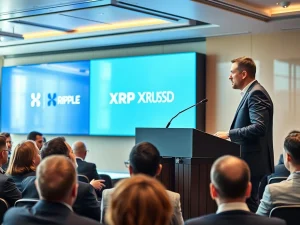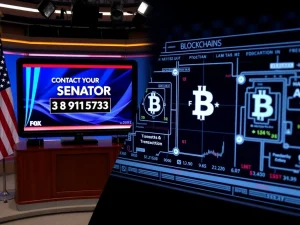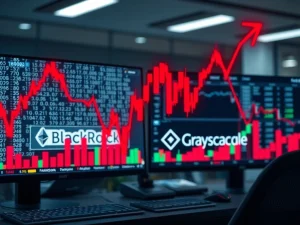AI Crypto Payments: Google’s Game-Changing Protocol Leads Today’s Crucial Crypto News

Are you tracking the fast-paced world of digital assets? Today, **AI Crypto Payments** emerged as a dominant theme, signaling a transformative shift in how artificial intelligence interacts with decentralized finance. Google unveiled a groundbreaking open-source protocol, promising to redefine transactions for AI applications. This significant development arrived alongside major advancements in **institutional crypto** solutions and pivotal discussions around **Bitcoin regulation** in Washington, D.C. Understanding these **daily crypto trends** is essential for anyone navigating the evolving blockchain landscape.
Google Unveils Game-Changing AI Crypto Payments Protocol
In a move set to reshape the future of digital transactions, Google has officially launched an open-source protocol enabling AI applications to send and receive payments. This innovative system includes crucial **stablecoin integration**, underscoring the growing importance of dollar-pegged cryptocurrencies in the burgeoning AI-driven economy. This initiative represents a significant step forward, making AI agents capable of transmitting real-world value.
The tech giant did not embark on this venture alone. Google partnered with industry heavyweights such as Salesforce and American Express, alongside over 60 other companies, as reported by Fortune. Notably, the **stablecoin integration** functionality developed in close collaboration with crypto exchange Coinbase. Furthermore, the Ethereum Foundation provided key consultations on the project, ensuring robust and decentralized capabilities. James Tromans, head of Web3 at Google Cloud, confirmed the rollout. He emphasized that the protocol supports both ‘existing payment rail capabilities as well as forthcoming capabilities such as stablecoins.’ This dual approach ensures broad applicability and future-proofing.
Coinbase engineer Erik Reppel highlighted the collaborative spirit. He stated that the exchange worked with Google to ensure interoperability between their payment systems. ‘We’re all working to figure out how to make AI transmit value to each other,’ Reppel explained. This sentiment captures the industry’s collective effort to bridge AI and blockchain technologies. The new payment system builds upon Google’s existing Agent2Agent Protocol, first introduced in April. That protocol established a framework for AI agents to exchange information and interact more efficiently. Over 50 technology partners, including PayPal, SAP, and consulting giants like Deloitte and McKinsey, supported its development. This latest announcement marks a pivotal moment. It accelerates the integration of AI agents – autonomous software programs capable of making decisions without human input – with decentralized finance (DeFi) protocols. Such an integration promises to streamline trading, enhance user interaction, and significantly expand real-world payment use cases, fundamentally altering **AI Crypto Payments** capabilities.
Institutional Crypto Sees Boost with Deutsche Börse’s AnchorNote
Capital efficiency and trading flexibility remain paramount for institutional crypto investors. Addressing these needs, Crypto Finance, a subsidiary of the prominent Deutsche Börse Group, has launched a novel off-exchange settlement solution. This new product, called Crypto Finance AnchorNote, allows institutions to execute trades across various platforms without the necessity of moving their assets out of secure custody. Consequently, it drastically reduces counterparty risk and operational friction. This development is a crucial step for **institutional crypto** adoption.
AnchorNote offers multiple benefits. It enables institutions to settle trades off-exchange and even earn yields within a fully compliant, risk-controlled framework, according to a Tuesday announcement. Philipp Dettwiler, head of custody and settlement at Crypto Finance, highlighted its importance. ‘With Crypto Finance AnchorNote, we are closing a critical gap between custody and capital efficiency,’ he affirmed. This solution ensures that large-scale investors can engage with digital assets more securely and efficiently. The initial launch focuses on the Swiss market, a recognized hub for crypto innovation. A broader European rollout is expected in the near term, signaling significant expansion plans. The system integrates BridgePort as a middleware layer, coordinating messaging across various exchanges and custodians. Dettwiler further added, ‘Together with BridgePort, we are delivering an integrated solution that allows institutional clients to operate securely, flexibly, and in real time.’ This synergy creates a robust infrastructure for advanced trading strategies.

The design of AnchorNote prioritizes ease of use and security. Crypto Finance stated that AnchorNote simplifies the process of moving collateral quickly between platforms. Institutions can access this service through a user-friendly interface or via a direct API connection. This flexibility caters to diverse operational needs, from manual oversight to automated trading systems. The platform’s ability to maintain assets in secure custody while facilitating active trading represents a significant advancement. It addresses long-standing concerns about asset security and liquidity, making **institutional crypto** investments more attractive and manageable. This solution will undoubtedly contribute to the broader acceptance and integration of digital assets within traditional financial markets, influencing **daily crypto trends** for years to come.
US Lawmakers Advance Bitcoin Regulation Discussions
Washington D.C. remains a crucial battleground for the future of digital assets. US lawmakers are preparing for a pivotal meeting with 18 crypto industry executives this Tuesday. The primary agenda revolves around how Congress can advance President Donald Trump’s proposed Strategic Bitcoin Reserve. This initiative aims to establish a national reserve of Bitcoin, highlighting its growing recognition as a strategic asset. The discussions underscore the increasing importance of sound **Bitcoin regulation** for national economic security.
Prominent figures from the crypto industry will attend this high-stakes roundtable. Attendees include Michael Saylor, chairman of MicroStrategy, a leading corporate holder of Bitcoin. Also present will be Fundstrat CEO Tom Lee, who also chairs BitMine, and MARA CEO Fred Thiel. Crypto advocacy group The Digital Chambers, which shared the full list with Crypto News Insights, and its affiliate, The Digital Power Network, will host the roundtable. These executives aim to build significant momentum behind the BITCOIN Act. This crucial measure, introduced by US Senator Cynthia Lummis in March, calls for the government to acquire one million Bitcoin (BTC) over a five-year period. Such a legislative push demonstrates a serious consideration of Bitcoin as a long-term strategic asset, rather than merely a speculative investment.
The meeting signifies a concerted effort by the crypto industry to engage directly with policymakers. They seek to educate lawmakers and influence the legislative process. The goal is to foster an environment conducive to innovation while establishing clear guidelines for digital assets. The proposed Strategic Bitcoin Reserve, if enacted, could have profound implications for the global financial landscape. It would legitimize Bitcoin further on a national level. Furthermore, it could encourage other nations to consider similar strategies, potentially impacting Bitcoin’s price and adoption rates worldwide. These ongoing discussions are critical for shaping the regulatory framework that will govern digital assets in the United States. They directly influence the future of **Bitcoin regulation** and the broader **daily crypto trends** that investors monitor closely. The outcome of these discussions could pave the way for a more defined and secure future for Bitcoin within the national economy, benefiting both individual and institutional participants.
Stablecoin Integration and Future Outlook for Crypto
Today’s developments collectively paint a picture of an industry rapidly maturing and integrating into mainstream finance and technology. Google’s commitment to **stablecoin integration** within its AI payment protocol marks a significant validation for digital dollar-pegged assets. This move suggests a future where AI agents conduct everyday transactions, from micro-payments to complex financial operations, using reliable and efficient digital currencies. The partnership with Coinbase and consultation with the Ethereum Foundation further solidify the technical foundation for such an ambitious undertaking. It showcases a collaborative spirit across the crypto ecosystem, bridging traditional tech giants with decentralized innovators. As AI continues to advance, its ability to transmit value autonomously will become increasingly vital, and stablecoins are poised to play a central role in this evolution.
Meanwhile, the advancements in **institutional crypto** solutions, exemplified by Deutsche Börse’s AnchorNote, are dismantling barriers for large-scale investors. By offering off-exchange settlement and enhanced capital efficiency, these platforms address critical concerns regarding security, liquidity, and regulatory compliance. This makes digital assets more accessible and attractive to traditional financial institutions. The gradual, yet steady, influx of institutional capital is a powerful indicator of crypto’s long-term viability and stability. Such infrastructure developments are fundamental for the market’s continued growth and its ability to handle larger volumes of sophisticated transactions. This strengthens the overall market infrastructure, which is a key component of positive **daily crypto trends**.
Finally, the ongoing dialogue around **Bitcoin regulation** in Washington, D.C., highlights the growing political and economic significance of Bitcoin. When prominent industry figures meet with lawmakers to discuss a ‘Strategic Bitcoin Reserve,’ it signals a profound shift. Bitcoin is no longer just a niche technology; it is becoming a subject of national strategic importance. The BITCOIN Act, championed by Senator Lummis, aims to secure a substantial reserve for the U.S. government. This initiative could set a precedent for how nations view and integrate decentralized digital assets into their financial strategies. The push for clear and supportive regulation is essential for fostering innovation, protecting investors, and ensuring the United States remains competitive in the global digital economy. These discussions are critical for shaping a clear path forward for Bitcoin and the broader crypto market, influencing investor confidence and market direction.
In conclusion, today’s crypto news showcases a powerful convergence of technology, finance, and policy. From Google’s innovative **AI Crypto Payments** and **stablecoin integration** to Deutsche Börse’s robust **institutional crypto** solutions and the crucial **Bitcoin regulation** talks in D.C., the digital asset landscape is evolving at an unprecedented pace. These developments are not isolated events but interconnected threads weaving a new fabric for the global economy, promising both challenges and immense opportunities for investors and innovators alike. Keeping abreast of these **daily crypto trends** is more important than ever for navigating this dynamic market effectively.










